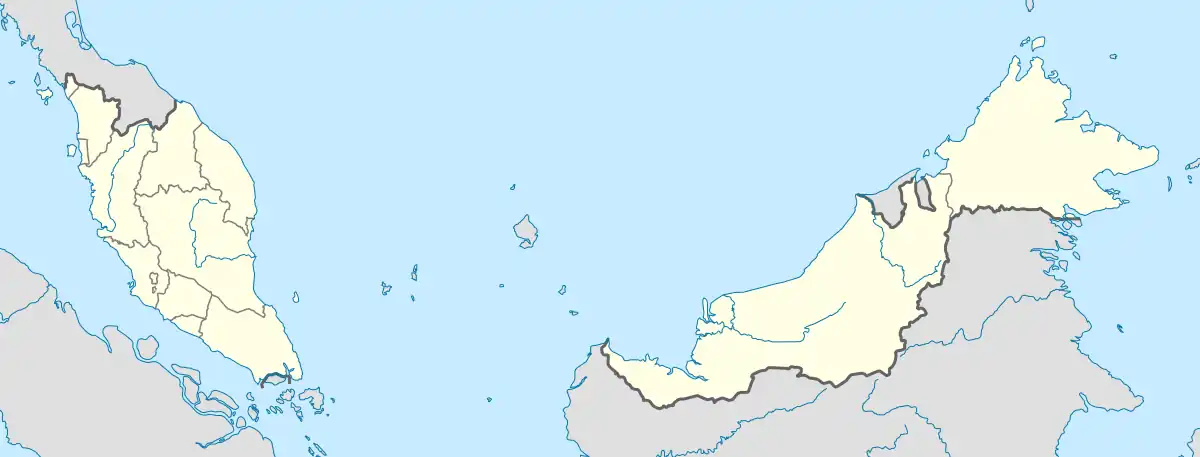Location of Kudat Peninsula in Sabah | |
 Kudat Peninsula Location of Kudat Peninsula in Malaysia | |
| Etymology | Semenanjung Kudat |
|---|---|
| Geography | |
| Location | Kudat Division |
| Coordinates | 6°56′8.642″N 116°45′42.309″E / 6.93573389°N 116.76175250°E |
| Archipelago | Maritime Southeast Asia |
| Adjacent to | |
| Administration | |
| State | |
The Kudat Peninsula (Malay: Semenanjung Kudat) is a peninsula in northern of Sabah, Malaysia. It consists of high coastal with windy shorelines and swamp areas.[1] The peninsula become the area where the South China Sea meets the Sulu Sea.[2]
Geology
Kudat formation is originated from deep marine environment.[3][4] The peninsula is geologically high flanked by deep structural depressions with the northern terrane comprises thick-bedded sandstone with interbeds of silty mudstone and contains calcareous nannofossil of Early Eocene to Middle Eocene that were deposited in deep-water setting in contrast to shallow-marine environments declared in previously published material.[5][6][7] In the central area of the peninsula in Sikuati located an oil seep in a tidal mangrove swamp surrounded by an adjacent green area of primary and secondary vegetation.[8]
Climate and biodiversity
The peninsula generally received mean annual rainfall ranging from 2,000 millimetres to 2,500 millimetres while part in the southern received rainfall between 2,500 millimetres to 3,000 millimetres.[9] Together with Bengkoka Peninsula, it is part of the Tun Mustapha Marine Park which includes coral reefs conservation.[2]
References
- ↑ Rough Guides (6 January 2018). The Rough Guide to Malaysia, Singapore & Brunei. Apa Publications (UK) Limited. p. 618. ISBN 978-1-78919-418-0.
- 1 2 Zarinah Waheed; Harald G. J. van Mil; Muhammad Ali Syed Hussein; Robecca Jumin; Bobita Golam Ahad; Bert W. Hoeksema (2015). "Coral Reefs at the Northernmost Tip of Borneo: An Assessment of Scleractinian Species Richness Patterns and Benthic Reef Assemblages". PLOS One. 10 (12): e0146006. Bibcode:2015PLoSO..1046006W. doi:10.1371/journal.pone.0146006. PMC 4697805. PMID 26719987.
- ↑ Samira Ghaheri; Mohd Suhaili; Nasiman Sapari; Mohammadsadegh Momeni (2017). Sedimentary architecture and depositional environment of Kudat Formation, Sabah, Malaysia. IOP Conference Series: Materials Science and Engineering, IOP Publishing. Vol. 291. p. 012025. doi:10.1088/1757-899X/291/1/012025.
- ↑ M.B. Gassim; Sanudin Tahir; D. A. Brunotte (2003). "Tectonic evolution of the Marudu Bay, Sabah, Malaysia". Journal of Southeast Asian Earth Sciences, Department of Earth Sciences, UKM Sabah Campus. 8 (1–4): 513–527. doi:10.1016/0743-9547(93)90049-U.
- ↑ F. Tongkul (2003). "Structural style of Kudat Peninsula, Sabah". Geology Program, School of Science and Technology, Universiti Malaysia Sabah. 29 (6): 290. Retrieved 31 May 2019 – via Geological Society of Malaysia.
- ↑ "Forest Management Plan [2016-2025]" (PDF). 2017: 7. Archived from the original (PDF) on 9 July 2021. Retrieved 31 May 2019 – via Acacia Forest Industries.
{{cite journal}}: Cite journal requires|journal=(help) - ↑ Ahmad Ridhwan Rahim; Zainey Konjing; Junaidi Asia; Nursyazwani Abdul Jalil; Abdul Jalil Muhamad; Norazhar Ibrahim; A. Munif Koraini; Razali Che Kob; Hisham Mazlan; H.D Tjia (2017). "Tectonostratigraphic terranes of Kudat Peninsula, Sabah" (PDF). Bulletin of the Geological Society of Malaysia, Geological Survey of Malaysia: 123 & 125. Archived from the original (PDF) on 31 May 2019. Retrieved 31 May 2019 – via Geological Society of Malaysia.
- ↑ Nurul Izzati Azman; Siti Nur Fathiyah Jamaludin (2017). Relationship of oil seep in Kudat Peninsula with surrounding rocks based on geochemical analysis. IOP Conf. Series: Earth and Environmental Science, IOP Publishing. Vol. 88. p. 1. doi:10.1088/1755-1315/88/1/012014.
- ↑ "Annual rainfall pattern of Sabah [Kudat Peninsula]". Government of Sabah. Retrieved 31 May 2019.